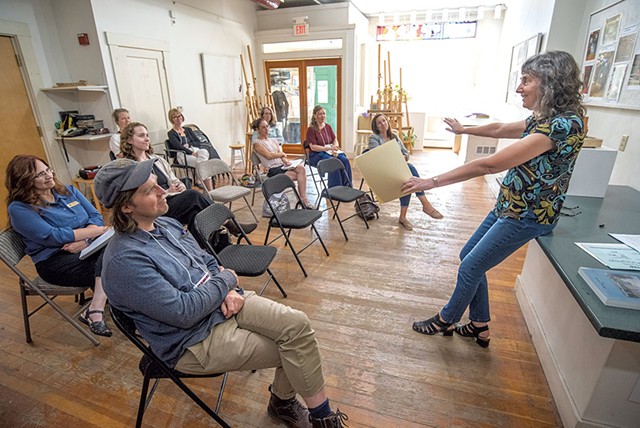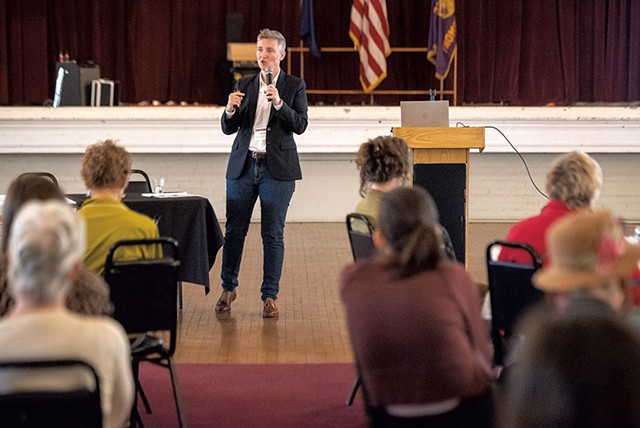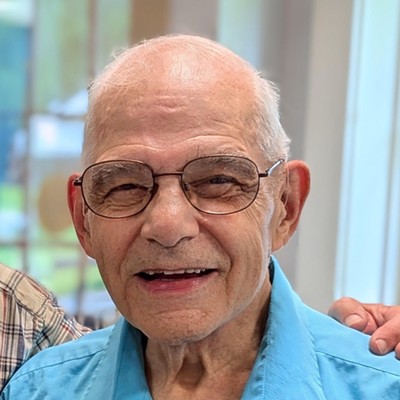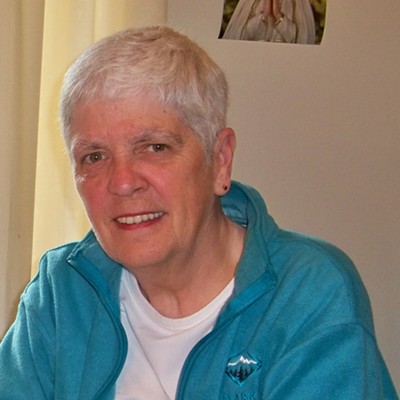
- Jeb Wallace-Brodeur
- Sue Higby (right)
Artists, musicians, librarians, and representatives of historical societies, municipalities and performing arts groups gathered in Barre last week to learn from experts, and each other, how to build disaster resilience.
Tropical Storm Irene in 2011 served as a wake-up call for the importance of such training, said Rachel Onuf, director of the Vermont Historical Records Program. Since then, COVID-19, back-to-back July floods and the recent detection of eastern equine encephalitis (EEE) have provided repeated, unwelcome reminders.
Eighty-four people participated in the Vermont Arts & Culture Disaster and Resilience Network's Day of Learning on September 17. Topics included how to hold events in an era of climate change; safe and inclusive cultural program planning; the business and legal considerations for emergency preparedness; and writing and maintaining an effective disaster plan. Three local groups that have coped with flooding opened their sites for tours.
The disaster and resilience network, formed in 2019, is a partnership of the Vermont Arts Council and the Vermont State Archives & Records Administration. It enables artists as well as arts and heritage organizations to share expertise and resources, mobilize response for emergency assistance, and engage collectively with first responders and emergency management agencies.
Disruptive events have become more unpredictable, said Day of Learning participant Andrea Otto, community liaison and film curator for Catamount Arts. Among other programming, the St. Johnsbury organization presents outdoor concerts. Three of its eight summer concerts at Dog Mountain were forced indoors to Fenton W. Chester Arena in Lyndon Center, according to development and communications director Ashley Van Zandt. July rains flooded Dog Mountain's fields and trails and washed out roads, driveways and pond banks.
"For us," Van Zandt said, emergency planning is "a very real issue and very relevant for our everyday work right now."
The Burlington Intervale, which sits along the Winooski River and is prone to disastrous flooding, harbored a second threat this year: mosquitoes. In late August, the Vermont Department of Health declared Burlington a high-risk town for mosquito-borne EEE and encouraged residents to stay inside between 6 p.m. and 6 a.m. until the first hard frost. That forced the Intervale Center to cancel the last two weeks of its Summervale festival series. Its Wintervale events, on the other hand, can't rely on snow, events manager Sammy LeVine said, asking, "How do we shift that?"

- Jeb Wallace-Brodeur
- Anna Glover
Keynote speaker Anna Glover aimed to help listeners embrace planning for uncertainty and risk and, by doing so, build resilience and community. Glover, who uses they/them pronouns, is director of theater safety and occupational health at Yale University's David Geffen School of Drama and the Yale Repertory Theatre. Their talk was titled "Beautiful Uncertainty: How to Live (and Thrive) With Risk."
Glover offered six tips to navigate uncertainty created by Ben Cattaneo, founder of London-based consulting firm the Decision-Making Studio. The first is to reduce reliance on things. For example, Glover said, before their keynote, "I practiced without notes. I practiced without PowerPoint. I practiced without a microphone." Doing so would help the talk succeed if the tools failed.
Build community, question everything, get involved, Glover continued, and ask, "What next?" as opposed to "Why me?" If an event goes awry, be the first to acknowledge it. "Tell it all. Tell it true. Tell it fast," Glover said, and be a source of information for others. Then ask, what do we need to keep going?
Glover suggested a higher goal than resilience: anti-fragility. Resilience implies getting back to the same place, Glover said. But changing and growing can make an organization stronger.
At Studio Place Arts in downtown Barre, executive director Sue Higby reeled off tip after practical tip for managing a building in a flood zone. Her three-story nonprofit is located on a block with a long history of flooding. Tip No. 1: Know where the water is coming from. Talk to neighbors and learn the history.
Higby went on: Set the elevator resting position to the first floor, not the basement. Pour a solution of white vinegar and warm water over sump pumps to make sure they are primed and ready to go. Cover pit pumps with wire mesh to block debris that could wash in and shut them off. Set up a generator; if the power company turns off electricity, as happened in Barre during the 2023 flood, sump pumps won't work.
Turn off the boiler and shut off the fuse for the elevator. Mark that fuse switch with white paint so it can be seen in the dark. Hang a flood to-do list inside a plastic sleeve along with a flashlight — on a cord to keep hands free — at the top of the basement steps.
After the 2023 flood, which left three and a half feet of water in SPA's basement and closed the building for about two weeks, Higby had two walls of the foundation renovated. The 2024 flood required a 20-minute cleanup with a Shop-Vac. Higby opened the next day. As a fundraiser — another arts organization essential — she asked artists to create works with the bricks salvaged from the foundation work. Higby auctioned them and raised $5,000 to help pay the bill. She gave other bricks to local students, then displayed their artworks in the studio.
"It's a good idea to look at your worst stories and try to flip them around and make something happen — maybe something beautiful happen," Higby said.
In her session at the end of the day, Jesse Keel, a preservation specialist from the Northeast Document Conservation Center, explained the hows and whys of conducting risk assessments, writing disaster plans, building supply kits, educating staff and keeping all of those elements up to date. She clicked through slides packed with tools, apps and phone numbers specifically designed for arts and cultural organizations.
Pat Fowler, archivist and collections manager for the Bellows Falls Historical Society, downloaded one of those apps before Keel's session even ended.





Comments
Comments are closed.
From 2014-2020, Seven Days allowed readers to comment on all stories posted on our website. While we've appreciated the suggestions and insights, right now Seven Days is prioritizing our core mission — producing high-quality, responsible local journalism — over moderating online debates between readers.
To criticize, correct or praise our reporting, please send us a letter to the editor or send us a tip. We’ll check it out and report the results.
Online comments may return when we have better tech tools for managing them. Thanks for reading.